Theology
Homily on the Meeting of the Lord
15. February 2012 - 9:54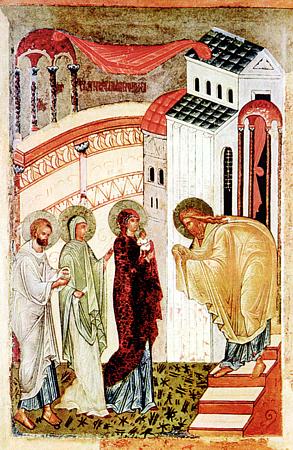 What a tender scene the Meeting of the Lord shows us! The venerable elder Simeon, holding the infant God in his hands, on either side of him are the righteous Joseph and the Most Holy Mother of God. Not far away is the Prophetess Anna, an eighty-year-old faster and woman of prayer. Their eyes are all directed toward the Savior. Their attention is absorbed by Him and they drink in spiritual sweetness from Him, which feeds their souls. You can judge for yourself how blessed was the state of these souls!
What a tender scene the Meeting of the Lord shows us! The venerable elder Simeon, holding the infant God in his hands, on either side of him are the righteous Joseph and the Most Holy Mother of God. Not far away is the Prophetess Anna, an eighty-year-old faster and woman of prayer. Their eyes are all directed toward the Savior. Their attention is absorbed by Him and they drink in spiritual sweetness from Him, which feeds their souls. You can judge for yourself how blessed was the state of these souls!
However, brethren, we are called not only to think about this blessedness, but also to taste it in reality, for all are called to have and carry the Lord in themselves, and to disappear in Him with all the powers of their spirit. When we have reached that state, then our blessedness will be no lower than that of those who participated in the Meeting of the Lord. They were blessed who saw it; we shall be blessed who have not seen, but believed. Pay attention. I will show you briefly how to achieve this. Here is what you should do.
The Sunday of the Prodigal Son
14. February 2012 - 9:37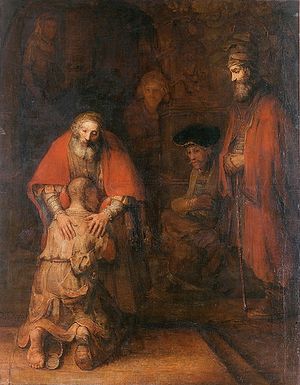 In the Name of the Father and of the Son and of the Holy Spirit.
In the Name of the Father and of the Son and of the Holy Spirit.
On this Sunday the Church tells the parable of the Father who had two sons. Like all parables, it has a symbolic meaning. Who is the Father and who are the two sons?
The Father represents God the Father, the Father of all mankind.
The elder son represents the Jewish people. The elder son represents the Jews, for alone of all people the Jewish people had kept the memory of God, accurately, faithfully conserving the stories of Creation, the story of the Fall of Mankind and the prophecies of the Coming of a Saviour, the Messiah. The Jews, the elder son, had remained with the Father.
Three Guiding Lights of True Faith
13. February 2012 - 10:35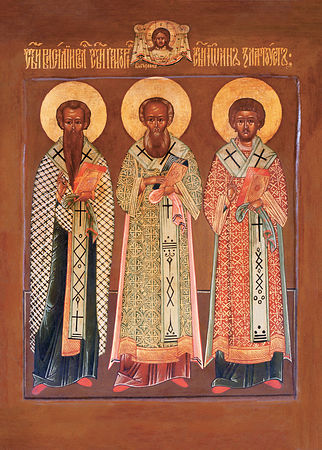 As the month of January draws to a close, the Church calls us on the 30th to celebrate the Feast of the Three Holy Hierarchs: St. Basil the Great, St. Gregory the Theologian and St. John Chrysostom.
As the month of January draws to a close, the Church calls us on the 30th to celebrate the Feast of the Three Holy Hierarchs: St. Basil the Great, St. Gregory the Theologian and St. John Chrysostom.
In celebrating these three great teachers of the Church, the Church in its hymnody refers to them as “harps of the Spirit,” “rays of light,” “scented flowers of Paradise,” “instruments of grace.” The Gospel read at Divine Liturgy is that of the Good Shepherd (John 10:9-16). This gospel, always appointed to be read on feast days of canonized bishops, speaks to us of the God-given role of the episcopacy to watch over our souls.
In these three great shepherds of the Church, we see both a commonality and differences that can enlighten us in how we lead our lives as Christians. Honored as supreme representatives of both the Church’s doctrinal and pastoral ministries, these men give us true examples of what it means to be Orthodox.
Translation of the Relics of St. John Chrysostom
10. February 2012 - 11:15Commemorated January 27/February 9
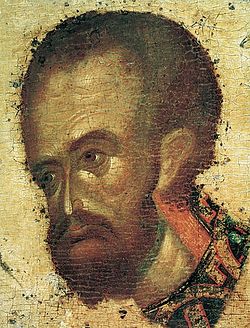 More than thirty years after John Chrysostom, Patriarch of Constantinople, reposed in the town of Comana, the Most Holy Proclus (the saint's disciple and successor as archbishop) was presiding over the annual service in honor of the great universal teacher. In his homily, delivered in the cathedral of the Imperial City, Proclus extolled the Lord's favorite, saying, "Only if another John were to appear could John fittingly be praised! When the faithful recall his labors, struggles, and discourses, their thirst is slaked, as though by a mighty river overflowing its banks. From John shine rays of God's grace in which one man clearly discerns the sun of the Godhead, another beholds the cleansing of Orthodoxy from heresy, another perceives the deceptiveness of idolatry, another distinguishes truth from error, another is confirmed in faith and virtue, and another observes gleaming heavenly crowns. Oh, hierarch whose memory is like a fragrant breeze! Oh, namesake of grace, whose deeds were truly divine! Oh, golden mouth declaring the word of God! Oh, tongue which spoke of mysteries loftier than the heavens! Oh, teacher proclaiming the gospel more loudly than thunder! Verily like unto John the Forerunner, the preacher of repentance, was this John. One was a herald, the other a trumpet. One was unshakeable, the other invincible. One was a virgin, the other a champion of purity. One baptized in the wilderness, the other lowered his nets in cities. One denounced adultery, the other reproved the avaricious. One was cast into prison, the other was exiled. One was beheaded, the other desired beheading for the truth. Many were John Chrysostom's struggles on earth, many are his crowns in heaven. He now cries out with the Apostle Paul, 'I am a sweet savour of Christ, having cleansed the whole world of the stench of error. In Ephesus I expunged the delusion of Midas, in Phrygia I rendered childless the mother of false gods, in Caesarea I did away with the houses of ill fame, in Syria I abolished the assemblies of the godless, and in Persia I sowed the seed of the word of God. Everywhere I have planted the Orthodox faith. By my teaching I have disseminated the knowledge of God throughout the earth; by my books I have spread the nets of salvation far and wide. With John the Theologian I theologized concerning the Word of the Father; with Peter I laid the foundation of an Orthodox confession; with the fishermen I cast the net of piety into the world.' O John, your life was truly sorrowful, but your death is precious, your sepulcher glorious, and your reward great!"
More than thirty years after John Chrysostom, Patriarch of Constantinople, reposed in the town of Comana, the Most Holy Proclus (the saint's disciple and successor as archbishop) was presiding over the annual service in honor of the great universal teacher. In his homily, delivered in the cathedral of the Imperial City, Proclus extolled the Lord's favorite, saying, "Only if another John were to appear could John fittingly be praised! When the faithful recall his labors, struggles, and discourses, their thirst is slaked, as though by a mighty river overflowing its banks. From John shine rays of God's grace in which one man clearly discerns the sun of the Godhead, another beholds the cleansing of Orthodoxy from heresy, another perceives the deceptiveness of idolatry, another distinguishes truth from error, another is confirmed in faith and virtue, and another observes gleaming heavenly crowns. Oh, hierarch whose memory is like a fragrant breeze! Oh, namesake of grace, whose deeds were truly divine! Oh, golden mouth declaring the word of God! Oh, tongue which spoke of mysteries loftier than the heavens! Oh, teacher proclaiming the gospel more loudly than thunder! Verily like unto John the Forerunner, the preacher of repentance, was this John. One was a herald, the other a trumpet. One was unshakeable, the other invincible. One was a virgin, the other a champion of purity. One baptized in the wilderness, the other lowered his nets in cities. One denounced adultery, the other reproved the avaricious. One was cast into prison, the other was exiled. One was beheaded, the other desired beheading for the truth. Many were John Chrysostom's struggles on earth, many are his crowns in heaven. He now cries out with the Apostle Paul, 'I am a sweet savour of Christ, having cleansed the whole world of the stench of error. In Ephesus I expunged the delusion of Midas, in Phrygia I rendered childless the mother of false gods, in Caesarea I did away with the houses of ill fame, in Syria I abolished the assemblies of the godless, and in Persia I sowed the seed of the word of God. Everywhere I have planted the Orthodox faith. By my teaching I have disseminated the knowledge of God throughout the earth; by my books I have spread the nets of salvation far and wide. With John the Theologian I theologized concerning the Word of the Father; with Peter I laid the foundation of an Orthodox confession; with the fishermen I cast the net of piety into the world.' O John, your life was truly sorrowful, but your death is precious, your sepulcher glorious, and your reward great!"
Metropolitan Amfilohije gets an honorary doctorate (honoris causa) of the Saint Sergius Orthodox Theological Institute in Paris
9. February 2012 - 12:11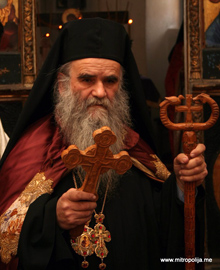 The Saint Sergius Orthodox Theological Institute in Paris announced that a formal session, at which the Metropolitan Amfilohije of Montenegro and the Littoral would be awarded with an honorary doctorate, to be held on February 12 of this year, commencing at 3 p.m. hours.
The Saint Sergius Orthodox Theological Institute in Paris announced that a formal session, at which the Metropolitan Amfilohije of Montenegro and the Littoral would be awarded with an honorary doctorate, to be held on February 12 of this year, commencing at 3 p.m. hours.
The session will be presided by His Eminence Archbishop Gabriel of Koman.
The announced agenda of the solemn session:
The award of the honorary doctorate honoris causa to His Eminence Archbishop of Cetinje and Metropolitan of Montenegro Amfilohije,
- A suitable commending speech (laudatio) of protopresbyter-staurophor Zivko Panev,
- A report on the academic year 2010/11 by protopresbyter Nikola Crnokrak, dean of the Institute,
- Academic lectures of professor Ivan Konig on the subject Uncreated Divine Light in the Teaching and Tradition of the Church: the Experience of the Early Centuries.
The Baptism of the Lord
23. January 2012 - 10:51John did restrain Him, saying: "I must needs be baptized of Thee, and dost Thou, then, come to me?"
But Jesus said unto him in reply: "Let it be, for now, for thus doth it behoove us to fulfill all righteousness." (Mt. 3, 14-15)
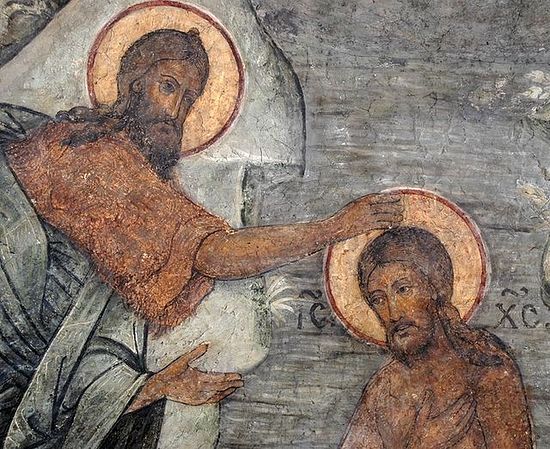 Today the entire Orthodox Church universal celebrates the festive remembrance and glorification of the Baptism of the Lord Jesus Christ by John the Baptist in the River Jordan. The holy Evangelist reports that when the Lord came to the Jordan to be baptized, John attempted to restrain Him, saying: "I must needs be baptized of Thee, and dost Thou, then, come to me?"
Today the entire Orthodox Church universal celebrates the festive remembrance and glorification of the Baptism of the Lord Jesus Christ by John the Baptist in the River Jordan. The holy Evangelist reports that when the Lord came to the Jordan to be baptized, John attempted to restrain Him, saying: "I must needs be baptized of Thee, and dost Thou, then, come to me?"
Would not we say the like, knowing Who this is Who has come: Lord, what doth it signify, this extreme humility of Thine, that Thou, the Lord Who is without sin, comest to be baptized of a man, even if he be one who is righteous through Thine own grace and righteousness?

